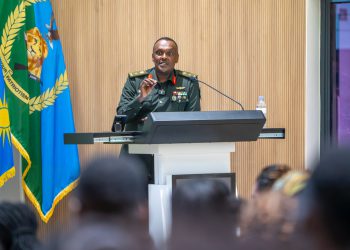Onesphore Birara’s village had been engulfed by terror. Hundreds of Hutu militias, the notorious Interahwamwe, were on rampage; brutally slaughtering every living Tutsi, men, woman and children.
They were so determined to the extent that they would go as far as plucking out fetuses from wombs before killing the mothers.
Terrified as they were, Birara and a handful of youths gathered at night and agreed to fight back and defend their village.
Unfortunately, they were ill equipped. They had no guns, no modern weapons, except for stones, bows and arrows.
To gain a strategic advantage, they moved up in the freezing hills and waited for the militias to strike, especially at night.
Every time they attacked, recalls Birara, “We pushed them back using spears and stones.” “We fought for some days and drove away the killers,” he says.
Trusting the camouflaged stranger
France had deployed over 2,500 troops in hotspots across Rwanda during the genocide, to support the government.
French troops offered training, arming and supporting the militias around the country. But the militias had failed to defeat the indomitable villagers of Bisesero.
The militias informed French troops that a certain group of villagers somewhere in a rural district of western Rwanda, were too fierce and determined. They, thus needed reinforcement to attack the defiant Tutsis.
Indeed, the villagers had managed to avert the mob of militias for several days, and their resolve was growing stronger day by day, until they committed the one mistake that broke their spine; trusting a stranger.
It was a hazy chilly morning when French soldiers appeared, clad in full military combat, armed for war.
They had carried with them a squad of highly trained Presidential Guards.
However, French soldiers lacked accurate intelligence, they feared attacking an ‘unknown enemy’. Instead, they played a ‘Good Samaritan’ hoax. They waived to the villagers, and showed them a sign of peace.
“It was our first time to see white people,” says Birara. The villagers felt some sort of relief.

Eric Nzabihimana, the only person who spoke French, was asked to meet with the French troops and explain their nightmare. “We thought they were our saviors,” Birara recalls. “We were wrong.”
Lured into the killers
French troops were successful with the trick. The villagers had been trapped. They were being lured into the killers.
In 2004, Birara told a mass of mourners who had gathered at the memorial to remember the victims that the attack French arrived on April 14, 1994.
Eric Nzabihimana met the French and came back with good news, Fake News. “French soldiers had assured they would protect us,” Birara recalls what Eric Nzabihimana said to the team. “We immediately descended downhill.”
Suddenly, the French drove off. The presidential guard squad and the militias emerged from cover, surrounded and massacred more than fifty thousand villagers. “They were many, we could not fight back.
“Had we not been betrayed by French troops,” Birara says, “There is a possibility some of these victims laying beneath this mass grave would still be alive today.”
Twenty years later, the tragedy is still fresh in survivors’ memory. “This place and what happened here remain in our memories,” says Birara.
In memory of the victims the macabre, the community has built a memorial and named it the ‘Bisesero National Resistance Monument’.
There is a curved stone surrounded by nine spears. The spears symbolize the nine neighboring villages where the Tutsis had come from.
Meanwhile after massacring the Basesero , later the French helped the militia and ex-FAR to escape into DR Congo after the RPA Inkotanyi took over and captured the area.
France denies role
France adamantly denies its role in the genocide, despite damning evidence corroborating with the accounts given by the survivors.
At one forum in Paris in 2014, a civil society group (Forum de la Memoire), whose members were in Rwanda during the genocide and witnessed in events real time, denounced France’s arrogance and snubbing its complicity.
Bernard Kouchner, who was France’s foreign minister during the genocide, and François Leotard, who was the defense minister, attended the discussions.
Pressed harder, they narrowly admitted, but marinated that it was “a political mistake”.
During 2014’s commemoration, Benjamin Abtan, a French activist, led a delegation of tens of French youths on a fact-finding mission in Rwanda. They visited the Bisesero memorial site and paid tribute.
“We want the whole truth told,” Abtan told mourners at the site who had gathered to remember the victims. “They (victims) were brave men and women, we are here to honor them,”Abtan said.
Disturbed by the ugly image France’s complicity paints on French nationals, they demanded that those who orchestrated France’s involvement be held accountable.
“We want to know people who were responsible for such evil acts,” Abtan demanded.




















